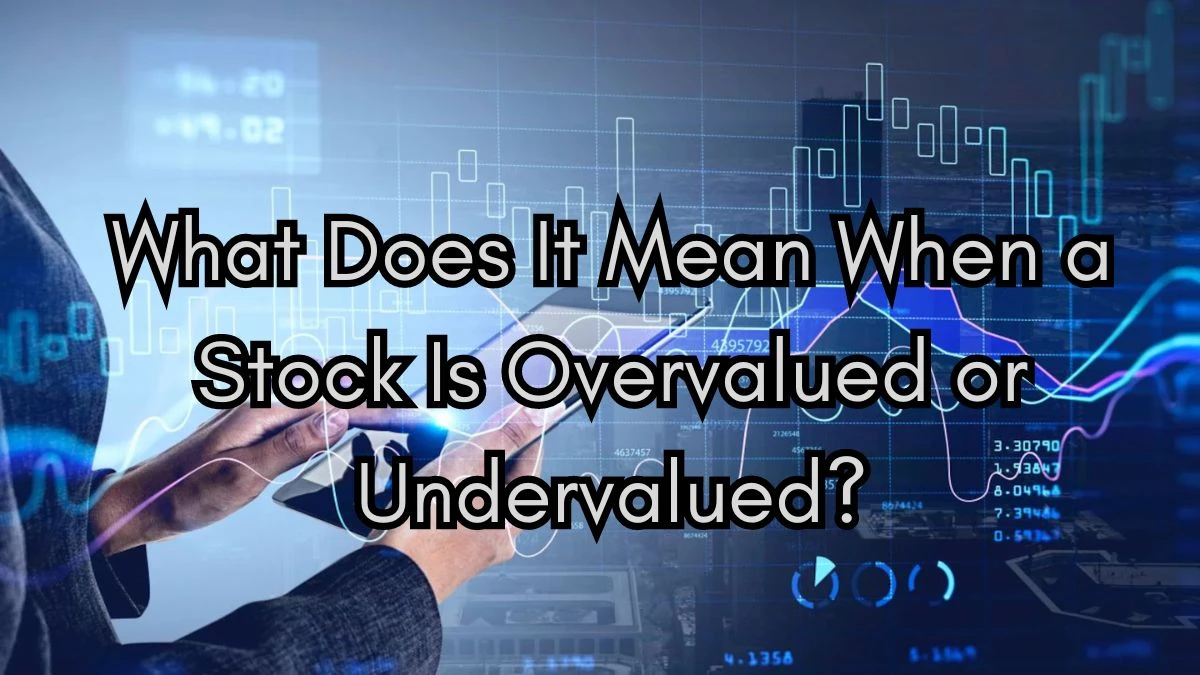
What Does it Mean When a Stock is Overvalued or Undervalued?
Overvalued stocks have prices surpassing their true value due to high future growth expectations, while undervalued stocks are priced below their worth, offering investment potential as their value is realized.
by Kavitha
Published Jun 03, 2024 | Updated Jun 03, 2024 | 📖 3 min read
Stocks and the Stock Market
A market place where investors buy and sell stocks and shares of corporations. A small portion of the corporation is yours when you purchase stock. The performance of the company and other variables, such as the state of the economy, can affect a stock's price. Stock investing is slightly risky because prices can change quickly, but it's also a common way for people to generate massive income. Because it allows investors to take part in the profits and helps companies raise capital to expand, the stock market is crucial.
What Does it Mean When a Stock is Overvalued or Undervalued?
When a stock is overpriced, it indicates that, according to a number of financial measures, its present market price exceeds its true value. Because of the high expectations for the stock's future growth, investors may believe it is worth more than it actually is. Because of this, purchasing the stock may be dangerous since there's a potential that the price may fall if those lofty expectations aren't fulfilled.
Alternatively, an undervalued stock is one whose market price is less than its true value. This can happen when a company is temporarily having issues or when a large number of investors have not yet identified the stock. Because there's a chance more people will understand an undervalued stock's genuine value and drive up its price, it might be an excellent investment.
How to Know if a Stock is Undervalued or Overvalued?
Investors use different ratios to help figure out if a stock is overvalued or undervalued. Here are a few common ones:
P/E Ratio (Price-to-Earnings): The price of the stock is compared to its earnings per share using this ratio. An excessive price-to-earnings ratio (P/E) may indicate that investors are overpaying for the stock. A low P/E ratio can indicate that the stock is cheap.
PEG Ratio (Price/Earnings to Growth): This ratio includes the rate of increase in the stock's earnings. The stock is considered cheap if the PEG is less than 1.0 and it may be overvalued if the PEG is greater than 1.0.
P/B Ratio (Price-to-Book): The stock price and book value—that is, the company's assets less its liabilities—are evaluated in this ratio. A low P/B may indicate the company is undervalued, and a high P/B could suggest the stock is overvalued.
P/S Ratio (Price-to-Sales): The P/S ratio analyses the price of the stock in relation to sales. A high P/S ratio may indicate an overvaluation of the company, while a low P/S ratio may indicate an undervaluation.
These statistics give investors a quick indication of how fairly priced a stock is. Investors can improve their decision-making on the purchase or sale of equities by comparing these measures to those of comparable companies.
Does a High P/E Ratio Mean a Stock is Overvalued?
An overvalued stock may be indicated by a high P/E ratio. The current share price of a corporation is compared to its earnings per share (EPS) using this ratio. A high price-to-earnings ratio indicates that investors are paying an additional price for every dollar of earnings. This may be the case due to their expectation of significant future growth for the organization. It may also indicate that the stock is expensive in relation to its true earnings, which puts it in danger if the company's growth isn't what was anticipated. Thus, even if an elevated P/E ratio frequently indicates overvaluation, it's crucial to consider additional considerations.
What does it Mean When a Stock is Overvalued or Undervalued - FAQs
1. What is the stock market?
The stock market is a place where investors buy and sell shares of corporations.
2. What does it mean if a stock is overvalued?
An overvalued stock has a market price higher than its true value based on financial measures.
3. How can you tell if a stock is undervalued or overvalued?
Investors use ratios like P/E, PEG, P/B, and P/S to determine if a stock is undervalued or overvalued.
4. Does a high P/E ratio always mean a stock is overvalued?
A high P/E ratio often suggests overvaluation but should be considered with other factors.




